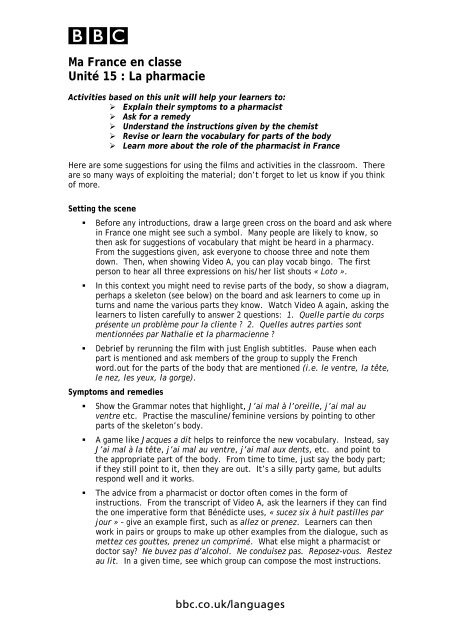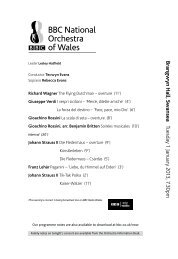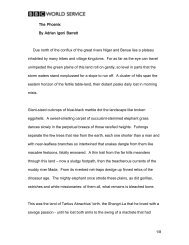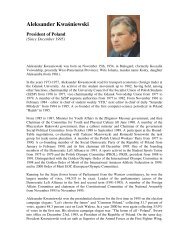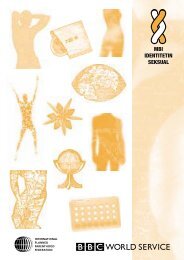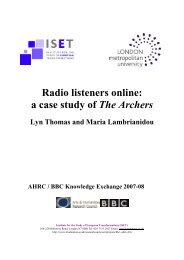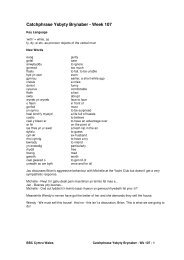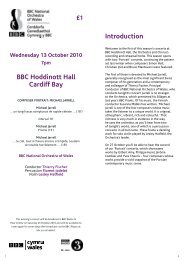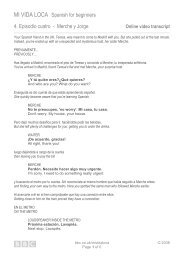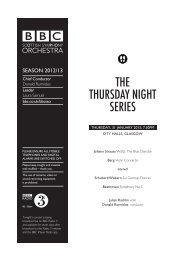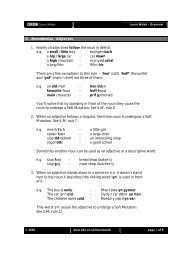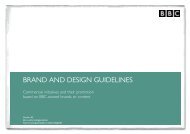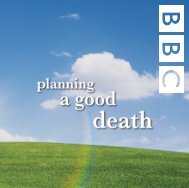Ma France en classe - BBC
Ma France en classe - BBC
Ma France en classe - BBC
Create successful ePaper yourself
Turn your PDF publications into a flip-book with our unique Google optimized e-Paper software.
<strong>Ma</strong> <strong>France</strong> <strong>en</strong> <strong>classe</strong><br />
Unité 15 : La pharmacie<br />
Activities based on this unit will help your learners to:<br />
Explain their symptoms to a pharmacist<br />
Ask for a remedy<br />
Understand the instructions giv<strong>en</strong> by the chemist<br />
Revise or learn the vocabulary for parts of the body<br />
Learn more about the role of the pharmacist in <strong>France</strong><br />
Here are some suggestions for using the films and activities in the classroom. There<br />
are so many ways of exploiting the material; don’t forget to let us know if you think<br />
of more.<br />
Setting the sc<strong>en</strong>e<br />
Before any introductions, draw a large gre<strong>en</strong> cross on the board and ask where<br />
in <strong>France</strong> one might see such a symbol. <strong>Ma</strong>ny people are likely to know, so<br />
th<strong>en</strong> ask for suggestions of vocabulary that might be heard in a pharmacy.<br />
From the suggestions giv<strong>en</strong>, ask everyone to choose three and note them<br />
down. Th<strong>en</strong>, wh<strong>en</strong> showing Video A, you can play vocab bingo. The first<br />
person to hear all three expressions on his/her list shouts « Loto ».<br />
In this context you might need to revise parts of the body, so show a diagram,<br />
perhaps a skeleton (see below) on the board and ask learners to come up in<br />
turns and name the various parts they know. Watch Video A again, asking the<br />
learners to list<strong>en</strong> carefully to answer 2 questions: 1. Quelle partie du corps<br />
prés<strong>en</strong>te un problème pour la cli<strong>en</strong>te ? 2. Quelles autres parties sont<br />
m<strong>en</strong>tionnées par Nathalie et la pharmaci<strong>en</strong>ne ?<br />
Debrief by rerunning the film with just English subtitles. Pause wh<strong>en</strong> each<br />
part is m<strong>en</strong>tioned and ask members of the group to supply the Fr<strong>en</strong>ch<br />
word.out for the parts of the body that are m<strong>en</strong>tioned (i.e. le v<strong>en</strong>tre, la tête,<br />
le nez, les yeux, la gorge).<br />
Symptoms and remedies<br />
Show the Grammar notes that highlight, J’ai mal à l’oreille, j’ai mal au<br />
v<strong>en</strong>tre etc. Practise the masculine/feminine versions by pointing to other<br />
parts of the skeleton’s body.<br />
A game like Jacques a dit helps to reinforce the new vocabulary. Instead, say<br />
J’ai mal à la tête, j’ai mal au v<strong>en</strong>tre, j’ai mal aux d<strong>en</strong>ts, etc. and point to<br />
the appropriate part of the body. From time to time, just say the body part;<br />
if they still point to it, th<strong>en</strong> they are out. It’s a silly party game, but adults<br />
respond well and it works.<br />
The advice from a pharmacist or doctor oft<strong>en</strong> comes in the form of<br />
instructions. From the transcript of Video A, ask the learners if they can find<br />
the one imperative form that Bénédicte uses, « sucez six à huit pastilles par<br />
jour » – give an example first, such as allez or pr<strong>en</strong>ez. Learners can th<strong>en</strong><br />
work in pairs or groups to make up other examples from the dialogue, such as<br />
mettez ces gouttes, pr<strong>en</strong>ez un comprimé. What else might a pharmacist or<br />
doctor say? Ne buvez pas d’alcohol. Ne conduisez pas. Reposez-vous. Restez<br />
au lit. In a giv<strong>en</strong> time, see which group can compose the most instructions.<br />
bbc.co.uk/languages
In the Jeu de Rôle, Stéphane poses other questions that the pharmacist is sure<br />
to ask, so play that sequ<strong>en</strong>ce, asking learners to interpret what he is asking.<br />
Get everyone to write down Stéphane’s part of the conversation, th<strong>en</strong> work in<br />
pairs to practise the sc<strong>en</strong>ario with a partner.<br />
For more practice with these expressions and the grammar that underpins<br />
them, play Pétanque. Put learners into teams of three or four and name team<br />
members, A, B & C etc. Play by giving turns first to all the As, th<strong>en</strong> the Bs<br />
etc. It builds up the susp<strong>en</strong>se. Which team gets the most right answers?<br />
The role of the pharmacist<br />
Video B is more chall<strong>en</strong>ging so why not give the transcript out first? Blank out<br />
the “medical” expressions: la pharmacie, une ordonnance, un conseil, les<br />
pilules, les préservatifs, les suppositoires, un stéthoscope. Put them and the<br />
English equival<strong>en</strong>ts in two columns at the bottom of the page. Invite the<br />
group first to match up the Fr<strong>en</strong>ch and English expressions. Th<strong>en</strong>, on the first<br />
showing simply ask them to tick off the Fr<strong>en</strong>ch words as they hear them.<br />
Wh<strong>en</strong> you show the film clip again, ask them to fill in the blanks in the<br />
dialogue. Confirm the answers by showing the film with English subtitles.<br />
Pause as the English word for the blank is shown and ask learners to supply the<br />
right Fr<strong>en</strong>ch expression.<br />
The compreh<strong>en</strong>sion quiz is actually an aid to understanding and not a test as it<br />
simplifies the key points of the dialogue. Show the questions on-scre<strong>en</strong> and<br />
invite learners to pick the answers they feel fit.<br />
The Chall<strong>en</strong>ge in Video C shows another facet of the pharmacist’s job but<br />
Bénédicte works in the city and doesn’t see mushrooms oft<strong>en</strong> <strong>en</strong>ough to really<br />
know them and it’s not easy for us to rise to the chall<strong>en</strong>ge either. Show the<br />
clip and ask the learners to suggest answers to two questions. 1. Pourquoi<br />
est-ce que l’assistant connait mieux les champignons ? 2. Quel bon conseil<br />
offre Bénédicte à la fin ?<br />
Consolidation<br />
Two of the activities provide an opportunity for differ<strong>en</strong>tiated homework.<br />
Weaker stud<strong>en</strong>ts will b<strong>en</strong>efit from trying the gap-fill E-mail activity.<br />
Afterwards, they might like to try composing their own message along similar<br />
lines. Those with a wider vocabulary could try the Quiz Culturel. If they<br />
hav<strong>en</strong>’t got Internet access at home, print out the page for them to match up<br />
the questions and answers.<br />
For more support<br />
All the activities are available online:<br />
http://www.bbc.co.uk/languages/fr<strong>en</strong>ch/mafrance/html/chemists/activity.shtml<br />
All transcripts are available online:<br />
http://www.bbc.co.uk/languages/fr<strong>en</strong>ch/mafrance/html/chemists/summary.shtml<br />
bbc.co.uk/languages
c.co.uk/languages


